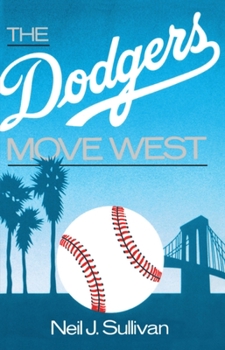The Dodgers Move West
Select Format
Select Condition 
Book Overview
For many New Yorkers, the removal of the Brooklyn Dodgers--perhaps the most popular baseball team of all time--to Los Angeles in 1957 remains one of the most traumatic events since World War II. Neil J. Sullivan's controversial reassessment of a story that has reached almost mythic proportions in its many retellings shifts responsibility for the move onto the local governmental maneuverings that occurred on both sides of the continent.
Conventional...
Format:Paperback
Language:English
ISBN:0195059220
ISBN13:9780195059229
Release Date:June 1989
Publisher:Oxford University Press, USA
Length:288 Pages
Weight:0.60 lbs.
Dimensions:0.7" x 5.6" x 8.5"
Customer Reviews
2 ratings
Highly objective and wothwhile
Published by Thriftbooks.com User , 18 years ago
I was a sad 10-year-old Brooklyn kid when I learned the dodgers were going to leave us. Like most everyone around, I tended to blame Walter O'Malley's greed. Yet in the end it may have been O'Malley's vanity more than his greed that was most responsible for the fateful decision. As Neil Sullivan so well points out, a strong case can be made that O'Malley didn't really want to leave at first. If he just wanted to take off, he would not have had the Dodgers play some of their home games in Jersey City. That had to be nothing more than an attempt to get the indifferent New York politicos to take him more seriously. In addition, O'Malley's family roots were all in New York. O'Malley wanted to build a ballpark at the junction of Flatbush and Atlantic Avenues, an ideal location as many subway lines converged there as well as the Long Island Railroad. O'Malley, in other words, believed in public transportation that would make it easy for the average working person to get to the ballpark. Robert Moses, who blocked O'Malley's path at every opportunity was determined to get the Dodgers out of urban Brooklyn and into what was then semi-suburban Queens. Moses hated the subway system and loved the automobile. It was he who insisted on building the Cross-Bronx Expressway, which tore the heart out of certain neighborhoods in that borough and today is both a bottleneck and an eyesore. Anything to accommodate suburbanites at the expense of the working stiffs. Moses claimeed that putting a ballpark at Flatbush and Atlantic would have caused many thriving businesses to relocate. In fact the Flatbush-Atlantic junction rapidly deteriorated and most of those thriving businesses went under on their own. The bottom line was that the unelected Parks Commissioner Moses considered himself the czar of all recreation in New York and was not about to let anyone build a ballpark anywhere except where he (Moses) wanted it. In fact what O'Malley proposed was an urban renewal project that was none of the Parks Commissioner's business. But New York's mayor at the time, Robert F. Wagner had the backbone of a jellyfish and was not about to stand up to Moses. O'Malley, who had invested considerable time and effort on the Flatbush-Atlantic site, finally got tired of being strung along and had no desire to become Moses' tenant and underling in Queens. He saw an opportunity in L.A. and took it. And so today we have ugly Shea Stadium, neo-Stalinist in design, named for a politico, and built under the aegis of Moses, far more unattractive than O'Malley's Dodger Stadium. People can't wait for Shea Stadium to be torn down and replaced by a building with some charm, while O'Malley's beautiful ballpark wil last indefinitely into the future. Neil Sullivan's book is an excellent read and highly recommended.
The real reasons behind the dodgers move to Los Angeles
Published by Thriftbooks.com User , 24 years ago
Sullivan's masterful research draws the reader into the battle, fiancially and politically, to keep the Dodgers in brooklyn. This book takes you behind the scenes like no other. It's not just O'Malley packing up and leaving. I'll guarantee you at the end of this book, you'll be blown away at the many chances the Dodgers had at actually staying in Brooklyn. Also, you'll look at Robert Moses in a different way, and how I feel that he is as much to blame for the move too.





